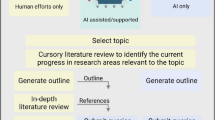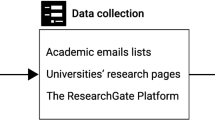Abstract
Plagiarism is a crime against academy. It deceives readers, hurts plagiarized authors, and gets the plagiarist undeserved benefits. However, even though these arguments do show that copying other people’s intellectual contribution is wrong, they do not apply to the copying of words. Copying a few sentences that contain no original idea (e.g. in the introduction) is of marginal importance compared to stealing the ideas of others. The two must be clearly distinguished, and the ‘plagiarism’ label should not be used for deeds which are very different in nature and importance.
Similar content being viewed by others
Notes
All arguments about citing a work one did not read seem to assume that the work was not read out of laziness or some other character flaw of the citing author. But if I learn about an article that is highly relevant to my work but cannot read it (e.g. my library does not have it and cannot get it) I can either not cite it (but one can then accuse me of not citing a work that I knew to be relevant) or cite it without reading it. Neither is satisfactory of course, but there may not be a third choice. Such deadlock situations are common and it is also common to blame people for not making the right decision, even when no outcome seems acceptable [15, 16]. One should also note that it is possible to know a work without reading the book—that I never read Newton’s Principia Mathematica does not mean that I do not know Newtonian mechanics.
If the writing is especially beautiful, witty, entertaining then by using someone else’s words I would steal some of the art or of the flair of the original author. But in many disciplines, beauty, wit, and entertainment are rare and not valued (if not banned) so that this counter-argument is limited to fields that value writing and to authors who actually write well.
One can remark that this offense can be committed only by non-native speakers (qua non-native speakers). Arguments against plagiarism are based on desert (the plagiarist does not deserve, the plagiarized would have deserved), but do native speakers deserve the advantage hereby enforced? Also, it is easy to set constraints that will not apply to oneself and to consider that problems other people may face cannot be serious.
One may note that, while in the case of researchers who do not cite sources one may mistakenly believe that the authors obtained the data themselves, such confusion is unlikely with undergraduate work. Picture an anthropology student writing an essay on some remote people in which citations are missing. Someone claiming that this student tried to deceive the teacher would thereby claim that the teacher may thus be deceived, i.e. made to believe that the student gathered the data himself.
References
Maddox, J. (1995). Plagiarism is worse than mere theft. Nature, 376, 721.
Loui, M. C. (2002). Seven ways to plagiarize: Handling real allegations of research misconduct. Science and Engineering Ethics, 8, 529–539.
Hexham, I. (1992). On plagiarism and integrity in scholarly activity. Humanist: Humanities Computing, 5, 4.
Park, C. (2003). In other (people’s) words: Plagiarism by university students—literature and lessons. Assessment and Evaluation in Higher Education, 28, 471–488.
Wilhoit, S. (1994). Helping students avoid plagiarism. College Teaching, 42, 161–165.
Burkill, S., & Abbey, C. (2004). Avoiding plagiarism. Journal of Geography in Higher Education, 28, 439–446.
Yilmaz, I. (2007). Plagiarism? No, we’re just borrowing better English. Nature, 449, 658.
Giles, J. (2006). Preprint analysis quantifies scientific plagiarism. Nature, 444, 524–525.
Sorokina, D., Gehrke, J., Warner, S., & Ginsparg, P. (2006). Plagiarism detection in arXiv. In: Proceedings of the Sixth International Conference on Data Mining 1070–1075.
Skandalakis, J. E., & Mirilas, P. (2004). Plagiarism. Archives of Surgery, 139, 1022–1024.
Benos, D. J., Fabres, J., Farmer, J., Gutierrez, J. P., Hennessy, K., Kosek, D., Lee, J. H., Olteanu, D., Russell, T., Shaikh, F., & Wang, K. (2005). Ethics and scientific publication. Advances in Physiology Education, 29, 59–74.
Giles, J. (2005). Taking on the cheats. Nature, 435, 258–259.
Martin, B. (1994). Plagiarism: A misplaced emphasis. Journal of Information Ethics, 3, 36–47.
Bensman, J. (1988). The aesthetics and politics of footnoting. International Journal of Politics, Culture, and Society, 1, 443–470.
Bouville, M. (2008). Whistle-blowing and morality. Journal of Business Ethics, doi:10.1007/s10551-007-9529-72.
Bouville, M. (2008). Why is cheating wrong?, available at http://www.mathieu.bouville.name/education-ethics/Bouville-cheating.pdf. Accessed 26 Feb 2008.
Standler, R. B. (2000). Plagiarism in colleges in USA, available at http://www.rbs2.com/plag.htm. Accessed 26 Feb 2008.
Vessal, K., & Habibzadeh, F. (2007). Rules of the game of scientific writing: Fair play and plagiarism. Lancet, 369, 641.
McCutchen, C. W. (1994). Plagiarism: A tale of telltale words. Journal of Information Ethics, 3, 48–50.
Williams, D. (2007). Plagiarism and redundancy. Biomaterials, 28, 2535.
Snapper, J. W. (1999). On the Web, plagiarism matters more than copyright piracy. Ethics and Information Technology, 1, 127–136.
Hinman, L. M. (2002). The impact of the Internet on our moral lives in academia. Ethics and Information Technology, 4, 31–35.
Stenflo, L. (2004). Intelligent plagiarists are the most dangerous. Nature, 427, 777.
Claxton, L. D. (2005). Scientific authorship—Part 1. A window into scientific fraud? Mutation Research, 589, 17–30.
Errami, M., & Garner, H. (2008). A tale of two citations. Nature, 451, 397–399.
Clarke, R. (2006). Plagiarism by academics: More complex than it seems. Journal of the Association for Information Systems, 7, 91–121.
Rathus, S. A. (1993). Thinking and writing about psychology. New York: Holt, Rinehart & Winston.
Weyland, K. (2007). How to assess plagiarism of ideas?. PS: Political Science and Politics, 40, 375–376.
Bechhoefer, I. (2007). Plagiarism: Text-matching program offers an answer. Nature, 449, 658.
Townley, C., & Parsell, M. (2004). Technology and academic virtue: Student plagiarism through the looking glass. Ethics and Information Technology, 6, 271–277.
Brumfiel, G. (2007). Turkish physicists face accusations of plagiarism. Nature, 449, 8.
Haramati, N., & Amis, E. S. (1994). Plagiarism—an odious accusation—worst if false. American Journal of Roentgenology, 163, 725–726.
Hunt, R. (2002). Four reasons to be happy about Internet plagiarism. Teaching Perspectives, 5, 1–5, available at http://www.stthomasu.ca/~hunt/4reasons.htm. Accessed 26 Feb 2008.
Kohn, A. (1996). Beyond discipline. Education Week 20 November 1996, available at http://www.alfiekohn.org/teaching/edweek/discipline.htm. Accessed 26 Feb 2008.
Nietzsche, F. (1881). The Dawn.
Author information
Authors and Affiliations
Corresponding author
Rights and permissions
About this article
Cite this article
Bouville, M. Plagiarism: Words and Ideas. Sci Eng Ethics 14, 311–322 (2008). https://doi.org/10.1007/s11948-008-9057-6
Published:
Issue Date:
DOI: https://doi.org/10.1007/s11948-008-9057-6




